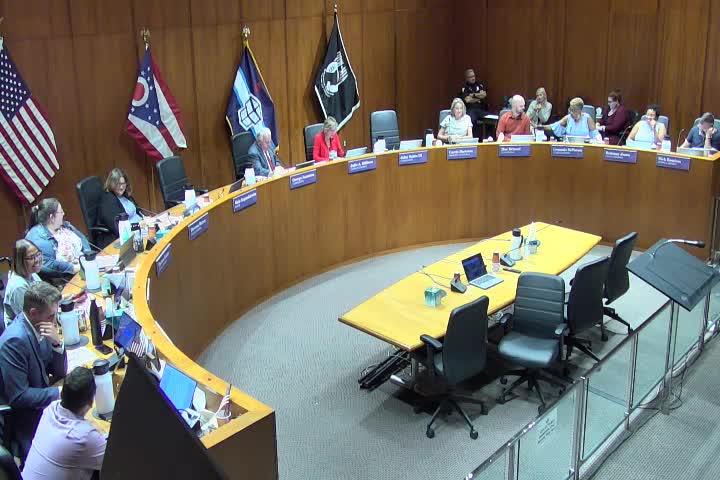Council considers ordinance requiring dumpsters for eviction set-outs after members cite blight, enforcement concerns
September 30, 2025 | Toledo, Lucas County, Ohio
This article was created by AI summarizing key points discussed. AI makes mistakes, so for full details and context, please refer to the video of the full meeting. Please report any errors so we can fix them. Report an error »

Councilmember Comives presented an ordinance to amend Toledo Municipal Code 17.25 to require a dumpster or container for eviction set-outs, citing repeated large set-outs that leave neighborhoods blighted. "Those 2 set outs just kept getting added to and added to...referred to me by a resident...as a mini landfill," Comives said, describing a Colburn Street incident where crews had to spend a full afternoon clearing two landlord-related set-outs.
Comives said the City of Columbus told the delegation that its practice is to have landlords provide dumpsters after evictions. "Their director laughed and then said, we don't. The landlords provide their own dumpster," Comives said, noting the policy is not uncommon elsewhere.
Sponsors argued the proposal would shift disposal responsibility to property owners and reduce repeated cleanups that currently fall on city crews. Councilwoman Williams called the idea "genius" and said many landlords already pay for post-eviction removal; she said a one-day dumpster can cost about $60 in some cases.
Council members pushed back with enforcement and equity questions. Councilman Martinez and others asked how rules would affect small landlords, noting eviction is already costly and an added dumpster charge could be burdensome for small operators. Chair Komives said the city is still working with administration and municipal court on enforcement mechanics and cited one enforcement approach used elsewhere: if a dumpster is not present at the time of eviction, the executing officer may not allow the eviction to proceed. "In some cases...they don't allow that eviction to occur," Komives said.
Chair Komives said the council’s research found average dumpster costs are often substantially higher than $60—"in the range of, like, dollars 400 potentially"—and that the proposed penalty in the draft ordinance is set at roughly double that cost to incentivize compliance. He emphasized the proposal was being advanced as a two-read ordinance with no emergency clause to allow for public notice and administrative work.
The council requested additional data and a hearing. Director Robeson provided councilwide figures for recent years: in 2022 the city assessed $1,452,367 for property cleanup and related work and collected $531,738; in 2023 it assessed $1,254,770 and collected $585,388, figures Robeson said include board-ups and other code fees. Robeson cautioned that assessed amounts do not equal full program costs and that collections often recover only a portion of assessed expenses.
Members asked for referrals to determine the full city cost of cleanup operations for 2024, to analyze how assessments are collected (including the county tax duplicate), and to explore alternative billing mechanisms such as adding charges to water bills for faster recovery. Council agreed to hold a public hearing and to continue working with the law department and municipal court on enforcement and collection options before final passage.
Comives said the City of Columbus told the delegation that its practice is to have landlords provide dumpsters after evictions. "Their director laughed and then said, we don't. The landlords provide their own dumpster," Comives said, noting the policy is not uncommon elsewhere.
Sponsors argued the proposal would shift disposal responsibility to property owners and reduce repeated cleanups that currently fall on city crews. Councilwoman Williams called the idea "genius" and said many landlords already pay for post-eviction removal; she said a one-day dumpster can cost about $60 in some cases.
Council members pushed back with enforcement and equity questions. Councilman Martinez and others asked how rules would affect small landlords, noting eviction is already costly and an added dumpster charge could be burdensome for small operators. Chair Komives said the city is still working with administration and municipal court on enforcement mechanics and cited one enforcement approach used elsewhere: if a dumpster is not present at the time of eviction, the executing officer may not allow the eviction to proceed. "In some cases...they don't allow that eviction to occur," Komives said.
Chair Komives said the council’s research found average dumpster costs are often substantially higher than $60—"in the range of, like, dollars 400 potentially"—and that the proposed penalty in the draft ordinance is set at roughly double that cost to incentivize compliance. He emphasized the proposal was being advanced as a two-read ordinance with no emergency clause to allow for public notice and administrative work.
The council requested additional data and a hearing. Director Robeson provided councilwide figures for recent years: in 2022 the city assessed $1,452,367 for property cleanup and related work and collected $531,738; in 2023 it assessed $1,254,770 and collected $585,388, figures Robeson said include board-ups and other code fees. Robeson cautioned that assessed amounts do not equal full program costs and that collections often recover only a portion of assessed expenses.
Members asked for referrals to determine the full city cost of cleanup operations for 2024, to analyze how assessments are collected (including the county tax duplicate), and to explore alternative billing mechanisms such as adding charges to water bills for faster recovery. Council agreed to hold a public hearing and to continue working with the law department and municipal court on enforcement and collection options before final passage.
View full meeting
This article is based on a recent meeting—watch the full video and explore the complete transcript for deeper insights into the discussion.
View full meeting
